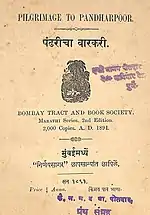Baba Padmanji | |
|---|---|
 | |
| Born | Baba Padmanji Mule 1831 Belgaum |
| Died | 29 August 1906 (aged 74–75) Bombay |
| Occupation | Writer |
| Language | Marathi |
| Nationality | Indian |
| Genre | Novel, Poetry, Prose |
| Subject | Christianity |
Baba Padmanji Mule, better known as Baba Padmanji (1831 - 29 August 1906) was an Indian writer, novelist, religious preacher and Protestant Christian reformer in the 19th-century Bombay Presidency, who is known for contributing to Marathi literature.[1] He is known for converting to Christianity from Hinduism in his early twenties and is considered the father of Christian literature in Marathi language.[2] He has published over a hundred books. His novel Yamuna Paryatan is the first independent social novel in Marathi.[3][4][5]
Life and work
He was born in May 1831 in Belgaum (now in Karnataka) to a Konkani-Marathi family. He attended a Christian missionary school in his hometown, where he developed his interest in Christianity. He went to complete his education at the Bombay Scottish Mission's Wilson School in 1849. Later, Baba worked as a teacher at the Free Church High School in Bombay, where he taught catechism and other Christianity related subjects.[4][6]
He was mentored by Murray Mitchell, John Wilson and Narayan Sheshadri. He was ordained Pastor at the Free Church in 1867, serving the Free Church of Pune till 1872.[1]
He also owned a printing press called Victoria Press in Bombay. He headed various Christian journals and magazines and authored more than 100 Marathi texts on Christian themes. In 1877, he rose to prominence for producing the first Bible (New Testament) translation with commentary made by native Christians.[1]
He died on 29 August 1906 and was buried at the Christian cemetery at Sewri, in Bombay.[1]
Bibliography

Some of his notable works include Streevidyabhyas Nibandh (1852), Vyabhichaar-Nishedhak Bodh (1854), Yamunaparyatan (1857), Sarvasangrahi urf Nibandhmala (1860), Shabdaratnavali (1860), Maharashtradeshachya Sankshipt Itihaas (1866), Streekanthabhushan (1868), A Comprehensive Dictionary of English and Marathi (second ed. 1870), Krushna Aani Khrista Yanchi Tulana (1873), Navya Kararavar Tika (1877) and Udgarmargvidnyan (1878).[4]
He authored an autobiography titled Arunodaya (Ascent of the Sun), published in 1888. Arunodaya was translated into many languages. Some scholars consider his book Yamunaparyatan (1857) to be the first independent novel published in Marathi.[7]
References
- 1 2 3 4 Dandekar, Deepra (4 July 2021). "Early feminist, pioneering novelist: Recalling colonial-era Marathi Christian reformer Baba Padmanji". Scroll.in. Retrieved 29 November 2022.
- ↑ "Baba Padmanji Mule". Sahapedia. Pune Cultural Mapping Team, Sahapedia. June 2021.
- ↑ Karhadkar, K. C., Baba Padmanji: His times and work. Mumbai, 1959
- 1 2 3 "बाबा पदमनजी". Marathi Vishwakosh. Government of Maharashtra.
- ↑ Dandekar, Deepra (14 December 2017). "Baba Padmanji (1831 – 1906): Conversion and Reform". ctla.llc.ed.ac.uk.
- ↑ Hawle, Prasad (12 February 2017). "स्त्रियांसहि ज्ञानाचें व धर्माचें खाजें पाहिजे!". Loksatta.
- ↑ Karambelkar, Omkar (25 December 2020). "ख्रिसमस: विविध क्षेत्रांमध्ये उल्लेखनीय काम करणारे मराठी ख्रिश्चन तुम्हाला माहिती आहेत का?". BBC Marathi (in Marathi).
External links
- Baba Padmanji: His times and work (A biography book written by KC Karhadkar)
- Arunodaya: The Autobiography of Bãbã Padamanjí, 1944 (An autobiography)